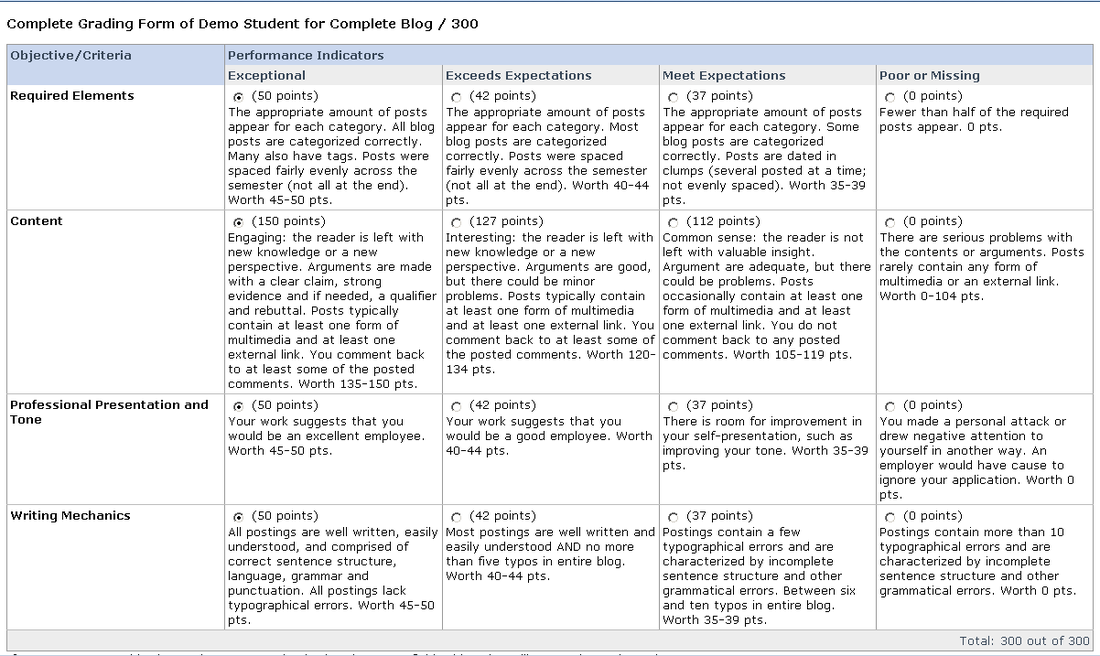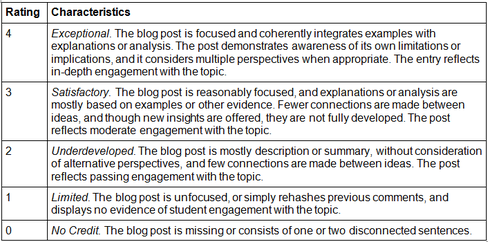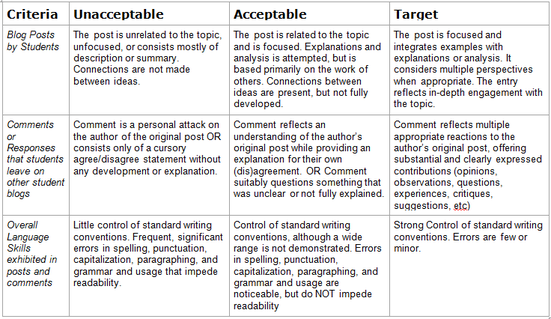While researching this idea, I spent a lot of time reflecting on my past use of student discussion boards and blogs. In my classroom, using these tools has always been a flop. Nevertheless, I realize that it is MY failing, not a failing on the part of my students. I have done exactly that of which I accuse my students: By failing to prepare, I prepared to fail. As Julie Meloni says in the blog Integrating, Evaluating, and Managing Blogging in the Classroom, “As with any assignment, students are likely to follow your lead with regards to valuing its overall importance. If you forget the blog exists, so will they—and I wouldn’t particularly blame them."
So why have I allowed this to occur? I think that time management is a serious issue. I have viewed blogs as an additional assignment, rather than a way to bring writing that is more traditional into the 21st century. Therefore, instead of replacing in-class writing assignments with blogs or discussion boards, I have just added them on and thus I begin to run out of time.
Another problem has been the method of evaluating the blogs. How does one truly evaluate (and grade) what is a reflection of the beliefs and musings of another person? I prefer short and simple evaluations when having to grade so many items. The problem I have had is that the rubrics I have typically found are similar to the one found on THIS website:
So why have I allowed this to occur? I think that time management is a serious issue. I have viewed blogs as an additional assignment, rather than a way to bring writing that is more traditional into the 21st century. Therefore, instead of replacing in-class writing assignments with blogs or discussion boards, I have just added them on and thus I begin to run out of time.
Another problem has been the method of evaluating the blogs. How does one truly evaluate (and grade) what is a reflection of the beliefs and musings of another person? I prefer short and simple evaluations when having to grade so many items. The problem I have had is that the rubrics I have typically found are similar to the one found on THIS website:
Not to say that this is too complicated, but it does entail multiple steps with different points for each criteria. Multiple steps for multiple blogs for multiple students plus math equals a LOT of time. I admire this professor’s commitment, but since time management is my biggest issue, I feel that I would fall short.
However, another of the posts that I found on ProfHacker by Mark Sample talked about how he assigned and evaluated student blogs. In the blog post A Rubric for Evaluating Student Blogs, Sample shares my concerns for time management, saying “But when you have 15 or 25 posts per week, per class, how do you grade them all? How do you let students know what kind of work you value?--And what kind of work they should likewise value? Assessing the enormous number of posts on the class blog is challenging, to say the least.” Consequently, his rubric is short and simple:
However, another of the posts that I found on ProfHacker by Mark Sample talked about how he assigned and evaluated student blogs. In the blog post A Rubric for Evaluating Student Blogs, Sample shares my concerns for time management, saying “But when you have 15 or 25 posts per week, per class, how do you grade them all? How do you let students know what kind of work you value?--And what kind of work they should likewise value? Assessing the enormous number of posts on the class blog is challenging, to say the least.” Consequently, his rubric is short and simple:
I like this rubric more than the previous example, but it does not address the language skills that I look for as a French and English/Language Arts teacher. It also does not address the need for authentic and real interaction amongst students. As stated by Konrad Glogowski in his blog entry Towards Reflective BlogTalk, "I find that for so many of my students [sic] blogging often becomes a race to publish, to write entries and receive comments. (Most of them measure the success of their blog by the number of comments they receive, and the content of the comment is often not as important as the mere fact that it is there). They rarely look critically at their own writing, preferring instead to judge their own work by the traffic that it attracts to their blog." This reflects the current social media trends, where we “like” a post on Facebook, or retweet something on Twitter, instead of actually commenting and engaging with the original poster. It is through these interactions that real growth and learning occurs.
This lack has resulted in the following rubric:
This lack has resulted in the following rubric:
Resources
Glogowski, K. (2008, Feb 04). Towards reflective BlogTalk [Web log message]. Retrieved from http://www.teachandlearn.ca/blog/2008/02/04/towards-reflective-blogtalk/
Meloni, J. (2009, Aug 13). Integrating, Evaluating, and Managing Blogging in the Classroom [Web log message]. Retrieved from http://chronicle.com/blogs/profhacker/integrating-evaluatingmanaging-blogging-in-the-classroom/22626
Nixon, B. (2009, Apr). Public relations matters. Retrieved from http://publicrelationsmatters.com/wp-content/uploads/2009/04/blog-rubric.pdf
Profhacker. (n.d.). Retrieved from http://chronicle.com/blogs/profhacker/
Sample, M. (2010, Sept 27). A rubric for evaluating student blogs [Web log message]. Retrieved from http://chronicle.com/blogs/profhacker/a-rubric-for-evaluating-student-blogs/27196
Glogowski, K. (2008, Feb 04). Towards reflective BlogTalk [Web log message]. Retrieved from http://www.teachandlearn.ca/blog/2008/02/04/towards-reflective-blogtalk/
Meloni, J. (2009, Aug 13). Integrating, Evaluating, and Managing Blogging in the Classroom [Web log message]. Retrieved from http://chronicle.com/blogs/profhacker/integrating-evaluatingmanaging-blogging-in-the-classroom/22626
Nixon, B. (2009, Apr). Public relations matters. Retrieved from http://publicrelationsmatters.com/wp-content/uploads/2009/04/blog-rubric.pdf
Profhacker. (n.d.). Retrieved from http://chronicle.com/blogs/profhacker/
Sample, M. (2010, Sept 27). A rubric for evaluating student blogs [Web log message]. Retrieved from http://chronicle.com/blogs/profhacker/a-rubric-for-evaluating-student-blogs/27196





 RSS Feed
RSS Feed
